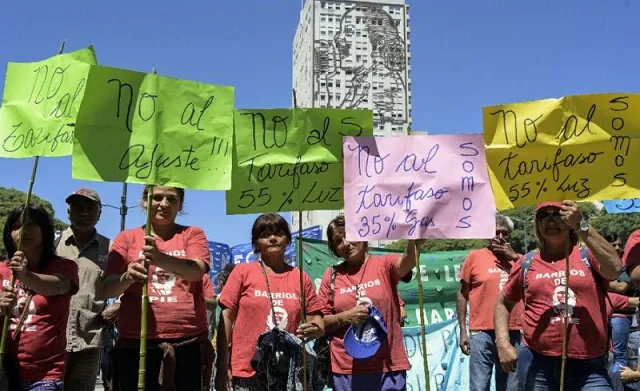“Chúng tôi đang mất đi việc làm, lương thực, giáo dục và nhà ở… Thật thất vọng rằng điều này có thể xảy ra.” Osvaldo, 60 tuổi, một thành viên của đoàn biểu tình tại Buenos Aires cho biết.
“Họ buộc chúng tôi không còn cách nào khác phải sử dụng đến việc xuống đường để đấu tranh cho quyền lợi.”, một người biểu tình khác tên Diego Quintero nói.

Hàng ngàn người xuống đường tại Argentina hôm 13/2 để phản đối chính phủ. Ảnh: AFP
Kể từ khi Tổng thống Mauricio Macri lên nắm quyền năm 2015, giá điện đã tăng 2,1% và gas tăng 3%. Chính quyền đổ lỗi cho chính phủ tiền nhiệm về sự gia tăng đột biến này khi đã cho cắt giảm các khoản trợ cấp.
Argentina lâm vào khủng hoảng kinh tế từ năm ngoái và đẩy Tổng thống Macri đến bước phải chấp nhận khoản vay cứu trợ 56 tỷ USD từ IMF. Cuộc khủng hoảng nổi lên với các dấu hiệu như sụt giảm niềm tin về tiền tệ khi đồng peso mất hơn một nửa giá trị so với đồng đôla, lạm phát đến cuối năm 2018 đạt 47,6%.
Đất nước này bước vào suy thoái hồi tháng 12/2018 khi văn phòng thống kê tiết lộ nền kinh tế trong quý III suy giảm, tình hình này đã xuất hiện kể từ quý II trước đó.
GDP của Argentina được Quỹ tiền tệ thế giới IMF dự báo sẽ giảm 2,6% trong năm 2019.
Một cuộc bầu cử sẽ diễn ra tại đất nước Nam Mỹ này để bầu chọn ra một Tổng thống mới.
Argentines protest in push for 'food emergency' declaration
(AFP) - Thousands took to the streets in 50 Argentine cities and towns Wednesday demanding that the government declare a "food emergency" and put an end to suffocating price increases.
"We are losing work, food, education, housing... it's desperation that is emerging among our people," said Osvaldo Ulacio, 60, as he marched in the capital Buenos Aires.
"They have left us no other tool than to come out in the streets to fight for our rights," added 29-year-old Diego Quintero.
Since President Mauricio Macri came to power in 2015, electricity bills have gone up 2.1 percent and gas 3 percent. The government blamed the increase on the removal of significant subsidies in place under the previous administration.
"In the neighborhoods, hunger has come back... it's the worst since the crisis in 2001," said Daniel Menendez, one of the protest leaders in Buenos Aires, referring to the year of a major financial crash.
"The crisis is dramatic with falling wages, factories and businesses closing, and soup kitchens full of people," said Juan Carlos Alderete, another leader.
Argentina was gripped by an economic crisis last year that forced Macri to agree to a $56 billion bailout loan with the IMF.
It was sparked by a fall in confidence in the currency, with the peso losing more than half its value against the dollar last year, while inflation finished 2018 at 47.6 percent.
The country entered recession in December after the statistics bureau revealed the economy had diminished during the third quarter of 2018, the second quarter in a row it had done so.
The International Monetary Fund predicts that GDP will fall by 2.6 percent this year.
This October, the South American country will go to the polls to elect a new president.


